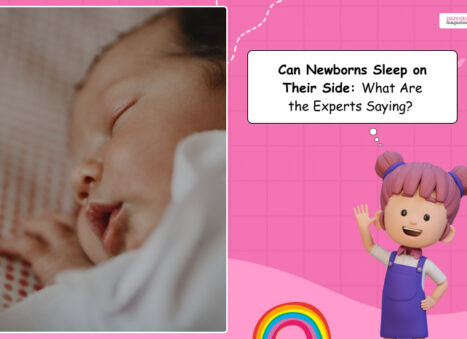
Is Milk Coming Out Of Baby’s Nose? Know The Causes And Remedies
Have you noticed milk coming out of baby’s nose? Well, there is nothing to worry about. Here, we are going to discuss all the questions and get you some peace of mind. Read the complete article and find out why it is happening and what the solutions you can try are.
There is nothing new that newborn babies go through a hefty learning curve and as you get to know the little one, there will be times when they will surprise you. One of those strange things could be when you notice that formula or milk is coming out of the baby’s nose.
Well, you might find it totally gross and freaky in the beginning, but when you see milk coming out of their nose, it is nothing scary. This is just a part of their life, and slowly, it will become one of those wonderful and weird parts of your life as well. But it is nothing unusual if you think about what you can do about this. Read the article, and you will find out.
Is it unusual if milk comes out of baby’s nose?
Gradually when they learn to suck and swallow the formula or milk, they often make a mess when you are feeding them or just after they are fed. Well, you might be expecting diaper blow-outs and newborn spit-ups, but you might be surprised when you see the milk you just fed coming out of their nose. In the beginning, it might be scary but try not to panic.
Milk coming out of the nose is completely normal and common in newborns. One of the studies showed that 67% of newborns who are from 0 to 3 months old experience this once in their lives. You might think of it to be gross, but it is just a part of who they are. Just clean the mess up and get on with it.
Why does this happen?
Newborns are popular for spitting up, so keep those burping cloths handy. This is also known as infant reflux, which is a form of natural reflux that pushes the milk up from the stomach to the esophagus. This reflux often has a way of causing forceful expulsion of their food, which is known as spit-ups.
As the mouth and nose are connected, the spit-up comes from the nose and not from the mouth. But do not confuse this with Gastroesophageal reflux disease, as this is a more serious condition and often requires medical attention.
This condition of milk coming out of a baby’s nose is known as nasal regurgitation. This is mostly caused when the digestive tract is underdeveloped, mainly the lower esophageal sphincter. This is the valve that prevents the stomach from sending the stomach contents back to the esophagus in all humans. However, in premature babies and twins, this valve does not develop completely by their birth. When the valve develops fully, the issue reduces slowly.
There are some other causes why milk comes out of a baby’s nose. Those are:
- When they lie flat for a long time
- If they have swallowed some air while they were feeding
- Overfeeding
- Distractions during feeding If they were distracted during feeding
- Cleft palate
- If they coughed and sneezed while feeding
A few of these causes could be a little tough to avoid with newborns; they are known to sleep for 16 hours a day and eat at any point when they are awake. This means there are some things you can do to help prevent the coming out of milk from the baby’s nose.
How can I prevent milk from coming out of baby’s nose?
You might get scared the first time you see milk coming out from your baby’s nose. It is not unusual to think what you can do to prevent this. You should know that some of the causes cannot be avoided, but there are a few things that you can do to reduce the chances of this happening.
Address Feeding Issues
Sometimes because of breastfeeding issues, nasal regurgitation happens. This may be because of a bad latch, overactive letdown, allergy, or an imbalance of hindmilk and foremilk. Consult a lactation specialist or a pediatrician for help.
When a baby is bottle-fed, it is not uncommon for them to eat a little fast to eat too much in one go. It is best to follow a feeding schedule to avoid overfeeding the newborn. Check out paced breastfeeding, which is a breastfeeding technique that helps bottle-fed babies to eat slowly and also reduces reflux.
If the baby is spitting up after every feeding, then try some other formula. This could help the baby to digest better and keep the food inside.
Switch Up Your Feeding and Nap Positions
Well, you can rely on gravity to prevent nasal regurgitation. And the best way of reducing reflux is by holding the baby upright while feeding.
Even if they are done feeding and sleepy, keep them in the same position for a minimum of 15 minutes. This helps the food to settle and starts the process of digestion. It is important to go by safe sleep practices and never use inclined sleepers.
Get the Air Out
When you are feeding the baby, make sure you burp them frequently. Do not let the air bubbles form. These bubbles keep growing until they burst and send the food back up into the. Because of this, burp the baby. Try burping them after feeding 2 to 3 ounces.
If the baby finds it hard to burp, then switch the positions until they do. Try laying them over the shoulder, sitting them upright on your lap, or laying them on your lap with their face down. Do not feed them anymore until they burp.
Hold the bottle at a 45-degree angle and always keep the nipple full to avoid any air bubbles from forming. And remember to burp them after every feeding.
When should I call a doctor if milk comes out of my baby’s nose?
Even though nasal regurgitation is mostly not worrisome, you may want to consult a doctor. And take it seriously if this is happening after every feeding session and all your tricks to reduce it are going in vain.
It is risky if they are regurgitating more than keeping down. That way, they are not getting an adequate amount of nutrition, and it can affect their overall growth and development. If you see they are losing weight and not gaining, consult a doctor immediately.
A baby with milk coming out of their nose needs medical attention rarely. If they are suffering from constant nasal regurgitation, having difficulty breathing, or not being willing to eat, check with a doctor.
Sometimes this happens because of an undiagnosed cleft palate. If this continues even after changing the equipment and position, then consult a pediatrician.
All of the issues go away by the time they complete one year. But if they still continue with this, get help from a doctor.
READ ALSO:
Already have an account?
Sign In
Create your account
User added successfully. Log in








